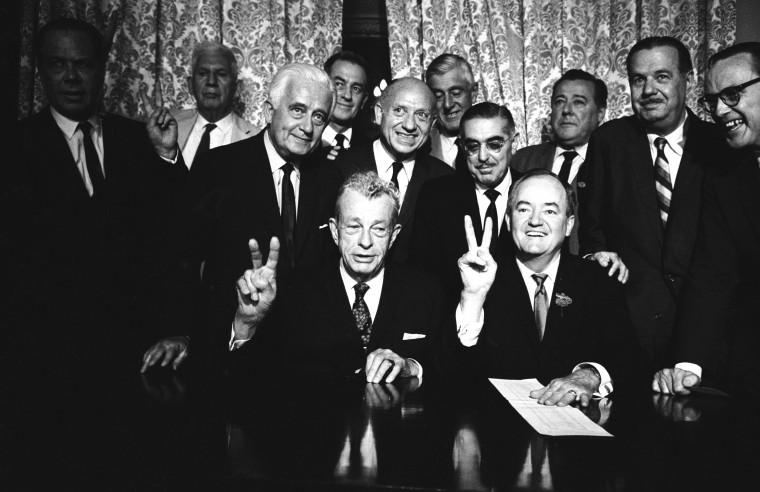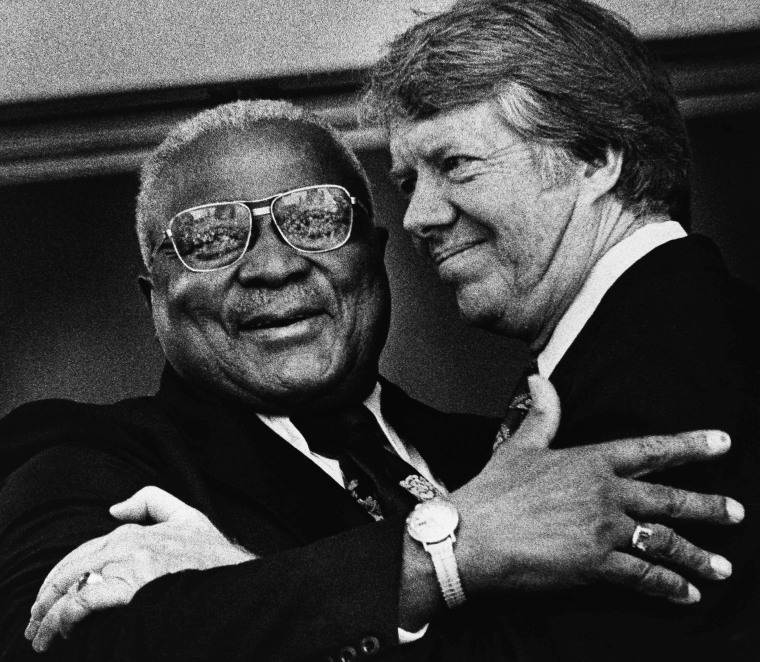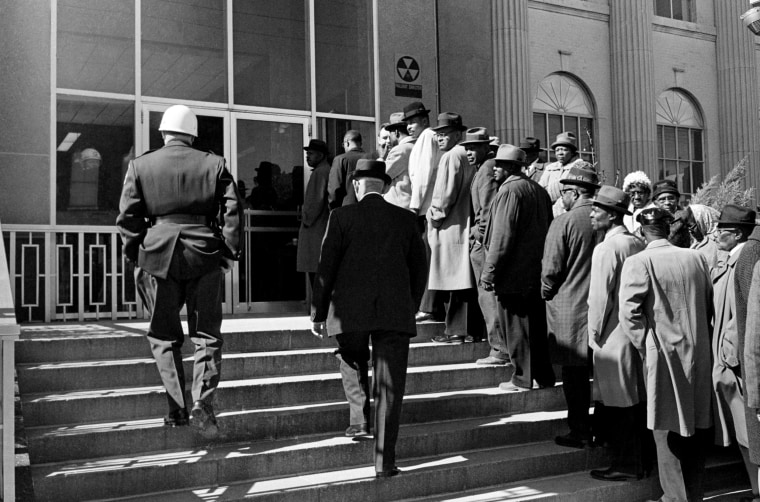Major reforms give primary voters more power than ever in choosing the Democratic presidential nominee. But barely a decade after the Voting Rights Act, millions of black Americans remain unregistered and the candidates court those who are with hesitation — and amid fear of a white backlash.
America's first post-Watergate presidential election marked a moment of transformation for Democratic Party politics.
Just eight years earlier, Hubert Humphrey had won the nomination without entering a single primary; but a spirit of democratizing reform was sweeping the party, and now there would be a record-high 30 state primaries and caucuses.
Some candidates, like former Georgia Gov. Jimmy Carter, were quick to adapt, entering early and competing in every state. Others, like California Gov. Jerry Brown, would wait before jumping in at the tail end of the primary calendar, hoping a late show of strength might carry over to the convention. And hovering over all of this was Humphrey, rumored all winter and spring to be waiting for a deadlock, and one more chance at the presidency.
More than a decade after the Voting Rights Act, millions of black Americans remained unregistered to vote, but the estimated 7 million who were tended to vote heavily Democratic.
Julian Bond, one of the first African Americans elected to office in the South after the Voting Rights Act passed, was poised to enter the race. Bond, then 35, served in the Georgia state Senate and as president of the Southern Poverty Law Center and promised a campaign that would mobilize black voters and build support for a more liberal party platform. But the flood of donations he was hoping for failed to materialize, and in the summer of 1975 he opted not to run. "It’s simply a matter of not having the money,"he explained. (“Julian Bond Rules Out Bid For ‘76 Race,” United Press International, July 11, 1975.) Months later, he toyed with a third party bid before passing on that, too.
Technically, two black candidates did enter the '76 race, but neither the mayor of Washington, D.C., Walter Washington, nor Walter Fauntroy, the district's nonvoting congressional representative, waged national efforts. Instead, the two local rivals headed dueling slates of uncommitted delegates in D.C.'s May primary.
That left black voters elsewhere to choose from an all-white field, and those white candidates to decide how — or even whether — to court a constituency that was still developing its political muscle. Racial tensions were roiling the urban North, with traditionally Democratic blue-collar voters resisting busing and open housing initiatives. Fear of alienating these voters accompanied the candidates' calculations on racial issues.

Humphrey, who'd first made a national name prodding Democrats to embrace a civil rights platform a generation earlier, was assumed to have the edge with black voters if he ran. Sargent Shriver, the party's vice-presidential nominee in 1972, was also deemed a likely choice for black voters because of his close association with the Kennedys. And Rep. Morris Udall, a liberal Arizonan, enjoyed support from prominent black colleagues in the House, including New York's Charles Rangel and Michigan's John Conyers.
And yet, in the first readout from a primary, it was someone else who seemed to break through: Carter, who carried the predominantly black wards in Boston during the March 3 Massachusetts primary.
The result was striking because Carter otherwise did poorly in the state, finishing fourth with just 13 percent. The Massachusetts primary, which was won by Sen. Henry "Scoop" Jackson of Washington, played out amidst exploding racial tensions in Boston, where a federal judge had declared the city's schools segregated and ordered busing as a remedy. Jackson touted his opposition to "forced busing," while Carter tapped his network of black supporters from his home state and ran ads in black neighborhoods featuring an endorsement from the Rev. Martin Luther King Sr., father of the slain civil rights leader.
It established a pattern, with Carter generally winning the black vote throughout the primary season. In the South, his numbers were overwhelming: 72 percent in Florida (where black voters were pivotal to his narrow victory over George Wallace) and 90 percent in North Carolina. In the North, there was more variance, with Carter winning only a plurality of the black vote in Pennsylvania and in the nonbinding Illinois primary and securing 50 percent in New York and 54 percent in Michigan, where Udall ran second among black voters with 41 percent.
"The phenomenon of blacks backing a Southern white reared in the Georgia backwoods is one of the most intriguing aspects of the campaign to date," Time magazine commented. (“Why Carter Wins the Black Vote,” Time, April 5, 1976).

Explanations were debated. Running in the South as the main alternative to Wallace, a leading segregationist of the civil rights era, surely played a role. But Carter had a record, too. As Georgia's governor, he had appointed African Americans to his administration, a seismic development in a Southern state, and declared in his inaugural speech as governor, "I say to you quite frankly that the time for racial discrimination is over." He also placed African Americans in visible positions in his campaign and made more appearances in black areas than his rivals.
"He isn't saying much," said Basil Paterson, a powerful Harlem Democrat and vice chairman of the Democratic National Committee. "But he’s going.” (“Blacks and Politics ‘76,” Dennis A. Williams with Henry McGee and Eleanor Clift, Newsweek, April 26, 1976.)
There was his religious devotion and comfort in black churches, too. "Carter," Newsweek wrote, "enjoys a communion with black audiences that few Northern politicians can match." Or, as Jesse Jackson, then a 34-year-old Chicago-based activist, put it: "The fundamental problem in this country today is not economic, it's spiritual. Carter is conducting a revival-of-hope campaign.”
Plenty of black leaders, though, weren't enamored of Carter. Bond, who'd been in the Georgia Legislature during Carter's governorship, called him "a bit too conservative for my taste." (“Julian Bond has chance to be presidential candidate,” Julie Lehr, Lansing State Journal, Jan. 30, 1976.)
Black voters' preference for Carter was also tested midway through the primary season when the candidate said he was against the government building low-income housing in middle-class areas of cities because "the ethnic purity of neighborhoods should be maintained." Carter apologized profusely ("I would sooner withdraw from the race then use racist appeals to win it"), but even Georgia Rep. Andrew Young, one of Carter's top black supporters, called the comment "a disaster.” (“Case of Two Jimmys and Ethnic Purity,” John Seigenthaler, The Tennessean, April 18, 1976.)
The controversy seemed to dent Carter's black support in Pennsylvania, which voted days later, but the damage didn't linger. Fueled in part by strong support from African American voters, Carter enjoyed sustained success during the long primary season, sufficient enough to hold off a late effort to deny him a first ballot nomination at the Democratic convention.

